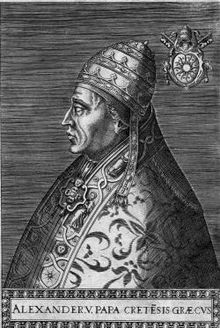Antipope Alexander V
|
Antipope Alexander V |
|
|---|---|

Antipope Alexander V (1409–1410)
|
|
| Papacy began | June 26, 1409 |
| Papacy ended | May 3, 1410 |
| Predecessor |
Gregory XII (Roman claimant) Benedict XIII (Avignon claimant) |
| Successor | John XXIII |
| Opposed to |
Gregory XII (Roman claimant) Benedict XIII (Avignon claimant) |
| Personal details | |
| Birth name | Petros Philargos |
| Born | 1339 Neapoli, Crete, Republic of Venice |
| Died | May 3, 1410 (aged 70–71) Bologna, Papal States |
| Nationality | Greek |
| Denomination | Roman Catholic |
| Coat of arms |  |
|
Papal styles of Alexander V |
|
|---|---|
 |
|
| Reference style | His Holiness |
| Spoken style | Your Holiness |
| Religious style | Holy Father |
| Posthumous style | Unknown |
Alexander V (Latin: Alexander PP. V, Italian: Alessandro V; also Peter of Candia or Peter Phillarges, ca. 1339 – May 3, 1410) was antipope during the Western Schism (1378–1417). He reigned from June 26, 1409, to his death in 1410 and is officially regarded by the Roman Catholic Church as an antipope.
Alexander V was born in Crete (Candia) in 1339 of Greek descent. He was born Petros Philargos, but is often known by the Italian version of this name, Pietro di Candia. He soon entered the Franciscan order, and his abilities were such that he was sent to study at the universities of Oxford and Paris. While he was in Paris the Western Schism occurred; Philarges supported Pope Urban VI (1378–89). He settled in Lombardy, where, thanks to the favour of Giangaleazzo Visconti, the Duke of Milan, he became bishop, first of Piacenza (1386), then of Vicenza (1387), then of Novara (1389), and finally Archbishop of Milan (1402).
On being created cardinal by Pope Innocent VII (1404–06) in 1405, he devoted all his energies to the reunion of the Church, in spite of the two rival popes. He was one of the promoters of the Council of Pisa and his politicking incurred the displeasure of Pope Gregory XII (1406–15), who ordered Philarges deprived of both his archbishopric and his cardinalatial dignity.
...
Wikipedia
